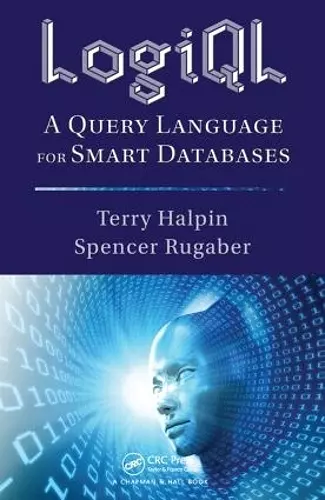LogiQL
A Query Language for Smart Databases
Terry Halpin author Spencer Rugaber author
Format:Paperback
Publisher:Taylor & Francis Inc
Published:13th Nov '14
Currently unavailable, and unfortunately no date known when it will be back
This paperback is available in another edition too:
- Hardback£180.00(9781138416543)

This book provides a thorough introduction to LogiQL, a versatile programming language ideal for building complex applications efficiently.
The book LogiQL introduces readers to a cutting-edge programming language rooted in Datalog, designed to streamline the development of applications that merge various programming paradigms. This innovative language facilitates the creation of hybrid applications, combining transactional, analytical, graph, probabilistic, and mathematical programming, which traditionally required a multitude of languages and databases. The authors provide a comprehensive guide on how to effectively design, implement, and query deductive databases using LogiQL, making it an essential resource for developers looking to enhance their skill set.
LogiQL employs a declarative approach that allows for the straightforward specification of complex data structures and business rules, which are then executed automatically. This feature makes it particularly advantageous for business applications that demand efficient implementation of intricate rules, such as predictive analytics and supply chain optimization. The book delves into these practical applications, showcasing how LogiQL can be leveraged to solve real-world problems.
Written in an accessible manner, the book caters to both beginners and seasoned developers. It is filled with numerous examples and exercises designed to reinforce key concepts and promote a deeper understanding of the language. By the end of the book, readers will be equipped with the knowledge and skills necessary to harness the full potential of LogiQL in their own projects.
"I gladly recommend the LogiQL book to anyone interested in databases. … The book is easy to read, contains many examples and exercises, and offers teachers involved in databases and their applications a very effective tool to get students to understand databases and how to program them."
—Dr. Herman Balsters, Associate Professor of Information Systems Design and Former Program Director of the Interfaculty of Industrial Engineering, University of Groningen
"The first mistake people will make is to think that LogiQL is another SQL. No, no. SQL is for accessing data and maintaining data integrity in a relational model. LogiQL discovers and deduces logical relations from predicates by looking at data and a set of predicates that define rules. If you ever worked with the Prolog language, then you know the difference.
LogiQL has an extensional database (EDB) and intentional database (IDB). EDB predicates normally are used to hold the facts that you explicitly enter into the workspace. In contrast, the facts populating IDB predicates are computed for you by your logic program. Think of SQL as a library and LogiQL is the research librarian.
This is the only book on LogiQL and it is designed as a textbook with examples and tests for someone who wants to learn this tool. Get the software, open the book, and get started."
—Joe Celko, Independent Database Consultant
ISBN: 9781482244939
Dimensions: unknown
Weight: 498g
352 pages